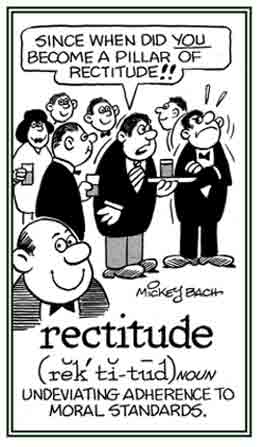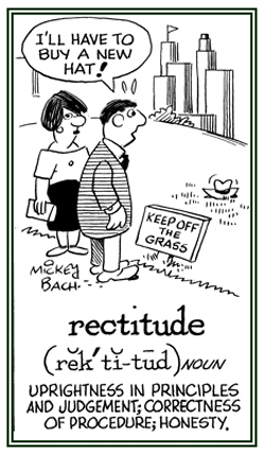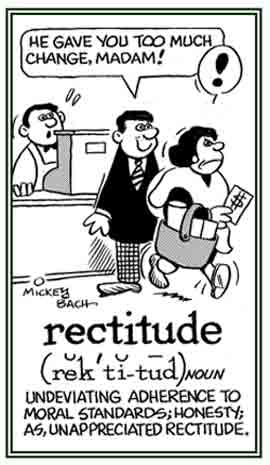-tude
(Latin: a suffix; state, quality, condition of)
2. The angular distance between an imaginary line around a heavenly body parallel to its equator and the equator itself: The span designating the horizontal intervals of latitude around the earth are measured in degrees and minutes.
3. Enough scope or leeway for some freedom of choice, action, or thinking: Shirley loves her job because she is allowed a lot of latitude in creating new approaches to achieve her objectives.
4. The degree of overexposure or underexposure that light-sensitive material can accommodate and still provide an acceptable image: Mary took the pictures hoping that the latitude in the film would be appropriate in producing a good contrast in the photographs.
5. In medical radiology, the range of and exposure that can produce a technically correct radiograph: With the technology involving x-rays, the latitude is also it's recording capability, providing the differences in density.
2. Loudness and the intensity or extreme volume of sounds: Sometimes the magnitude of the orchestra in the small theater significantly disturbed some members of the audience.
3. Greatness of character, rank, or position; also as a humorous title of address: Mr. Smith, the owner of the large company, had duties and responsibilities of such magnitudes that he had to hire additional experts to help him accomplish them.
4. A reference to immaterial things with a great degree of importance: Professor Williams is a scientist of considerable magnitude and eminence.
5. The intrinsic size of an earthquake or underground explosion: The magnitude of the tremors were impossible to endure for the people who lived in the affected area.


Go to this Word A Day Revisited Index
so you can see more of Mickey Bach's cartoons.
2. Gentleness and mildness: Some Christian believers tend to show a mansuetude of love for others by kindly listening to their questions, difficulties, or problems.
3. Etymology: from Latin mansuetudo, "tameness"; from mansuetus, "tamed"; from mansuescere, "to tame"; literally, "to accustom to the hand", from manus, "hand" + suescere, "to accustom, to habituate".


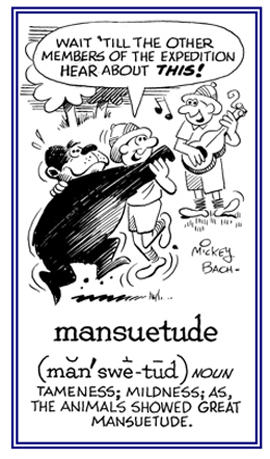
Go to this Word A Day Revisited Index
so you can see more of Mickey Bach's cartoons.
Obviously "moral inturpitude" is used by some people, but moral turpitude is the correct word to use when anyone wants to refer to "a vile, shameful, base person," or "a depraved act".
The following quotes were found in various places on the internet indicating that these people consider "moral inturpitude" as an acceptable usage
"Only a person of limited intelligence could misinterpret his words, or a person of moral inturpitude twist his words in such a disgusting manner to suit such low purpose."
"Establish license requirements for owners, operators, and employees to insure moral inturpitude in order to protect against sexually related crimes."
"I can see how moral inturpitude if in a trial that tells the truth or a history of violent crimes etc., could be a reason to restrict or monitor access, however I feel that closing the borders isn't the way to go."
"Then in the episode that aired on 2/29/06, they made a quip about a father being able to marry his own son in Massachusetts – alluding to the perceived moral inturpitude of the state allowing same-sex marriages.
". . . if you couldn't trust him the universe would implode as he is a mathematical constant, a pillar of moral inturpitude and friendship."
2. A quality of dishonesty or other immorality that is determined by a court to be present in the commission of a criminal offense; a crime involving moral turpitude.
3. Crimes involving moral turpitude have an inherent quality of baseness, vileness, or depravity with respect to a person's duty to another or to society in general. Examples include rape, forgery, robbery, and solicitation by prostitutes.
These laws are usually applicable only to United States law
Many jurisdictions impose penalties, such as deportation of aliens and disbarment of attorneys, following convictions of crimes involving moral turpitude.
Whether a criminal offense involves moral turpitude is an important determination in deportation, disbarment, and other disciplinary hearings.
Past crimes involving moral turpitude usually may also be introduced as evidence to impeach testimony. Theft, perjury, vice crimes, bigamy, and rape have generally been found to involve moral turpitude, while liquor law violations and disorderly conduct generally have not.
Legal definitions
A term of frequent occurrence in statutes, especially those providing that a witness' conviction of a crime involving moral turpitude may be shown as tending to impeach his credibility.
In general, it means neither more nor less than "turpitude"; that is, anything done contrary to justice, honesty, modesty, or good morals.
It is also commonly defined as an act of baseness, vileness, or depravity in the private and social duties which a man owes to his fellow man or to society in general; contrary to the accepted and customary rule of right and duty between man and man.
Although a vague term, it implies something immoral in itself, regardless of its being punishable by law. Thus excluding unintentional wrong, or an improper act done without unlawful or improper intent.
It is also said to be restricted to the gravest offenses, consisting of felonies, infamous crimes, and those that are malum in se ("wrong in itself" or "inherently and essentially evil") and disclose a depraved mind.
2. The common people generally or a large gathering of people.
3. A large indefinite number.
2. A lack of originality or being insignificant: The comments that Jack, the principal of the school, made to his teachers was so full of platitudes that it was difficult to continue concentrating and listening to what he was saying at the faculty meeting.



Go to this Word A Day Revisited Index
so you can see more of Mickey Bach's cartoons.
2. The condition of being full, ample, or complete.
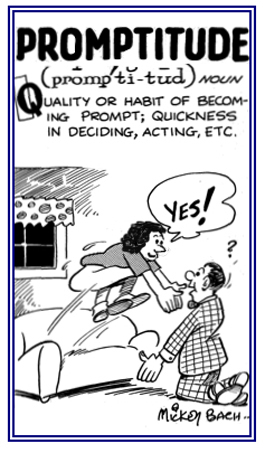
Go to this Word A Day Revisited Index
so you can see more of Mickey Bach's cartoons.
2. Moral beauty; those qualities of the mind which good men love and approve: Vincent fell in love with Kitty because of the pulchritudes shown by her purity of heart, her goodness, and her generosity.


Go to this Word A Day Revisited Index
so you can see more of Mickey Bach's cartoons.
